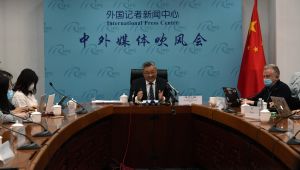In his opening statement releasing the 9/11 commission's report, chairman Thomas Kean highlighted the sobering fact that all experts expect a terrorist attack of greater proportions. He noted specifically that al-Qaeda aspires to attack us "with the use of chemical, biological and nuclear weapons".
For months, Boston officials have made vigorous preparations to defend the upcoming Democratic National Convention against the mega-terrorist attack the federal government has been warning us about. On a recent visit, Homeland Security Secretary Tom Ridge gave the security arrangements high marks. Boston Police Commissioner Kathleen O'Toole declared that we have "prepared for every possible scenario".
But against the backdrop of what President Bush has called his "ultimate nightmare: a nuclear terrorist attack," even $50 million worth of security preparations can do little to protect us. Indeed, the brute fact is that no amount of local efforts can be effective, because trying to prevent a nuclear attack by guarding the target is about as effective as trying to find a star by looking through the big end of a telescope.
The reasons are straightforward. First, the best way to prevent nuclear terrorism is to secure the insecure stockpiles of nuclear weapons or materials where they are: Russia, Pakistan, North Korea or at risky research reactors in transitional or developing countries. As former Sen. Sam Nunn has observed, "Acquiring weapons and materials is the hardest step for the terrorists to take, and the easiest step for us to stop. By contrast, every subsequent step in the process is easier for the terrorists to take, and harder for us to stop."
Second, the terrorists who may be planning a nuclear 9/11 are hiding out on the border of Pakistan and Afghanistan or some other distant location — not in Boston. It is critical to track down Osama bin Laden and his chief operating officer, Ayman al Zawahiri, wherever they may be. Al-Qaeda's leaders — like 9/11 architect Khalid Sheikh Mohammed, who was captured in Pakistan — direct operations at a distance.
A third possible line of defense is to block the avenues by which terrorists might bring a nuclear weapon into Boston. But to get a sense of the prospects of success, one need only "follow the drugs". The holes in our borders — from the thousands of cargo containers arriving in the port of Boston unopened, to the sailboats arriving on the Massachusetts coast from Canada without going through any customs procedures, to the automobiles, trucks and backpackers crossing the border from Canada to Maine or Vermont — allow 300 tons of cocaine to be smuggled into the United States each year.
Because the radioactive core of a nuclear bomb easily could be shielded from radiation detectors and would fit in a container the size of a six-pack of beer, the chances of intercepting it en route are not good.
Finally, though the closings of Interstate-93 and North Station might keep some forms of mayhem away from the convention, they will not stop a terrorist armed with a nuclear bomb. Detonated from the Boston Common, a sailboat in the harbor or the Bunker Hill Monument, a 10-kiloton nuclear explosion would leave the FleetCenter looking worse than the Alfred P. Murrah Federal Office Building after the Oklahoma City bombing.
My conclusion is not to despair. Indeed, the good news is that nuclear terrorism is, in fact, preventable. There is a finite amount of highly enriched uranium and weapons-grade plutonium in the world, and it is within our power to secure it from theft. Producing additional material requires processes that are complex, expensive and conspicuous, and thus vulnerable to interruption. This is a project to challenge our will, our conviction and our courage, not our technical capacity.
Although the Bush administration has said all the right things about preventing nuclear terrorism, its actions have not matched its rhetoric. As funding for homeland security projects has soared, nuclear threat reduction spending has stagnated. Remarkably, in the two years following 9/11, we actually secured less vulnerable nuclear material around the world than we did in the two years before 9/11.
For all their valiant efforts, there is nothing more convention security planners can do to address the threat of nuclear terrorism. The only way to prevent a nuclear attack is for the United States to go to the sources and lock down all weapons and materials there now.
Graham Allison is director of the Belfer Center for Science and International Affairs at Harvard University's Kennedy School of Government. His book Nuclear Terrorism: The Ultimate Preventable Catastrophe will be published next month.
Allison, Graham. “Zap Nuclear Terror Threat at its Source.” Boston Herald, July 25, 2004



